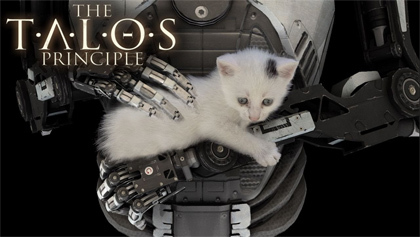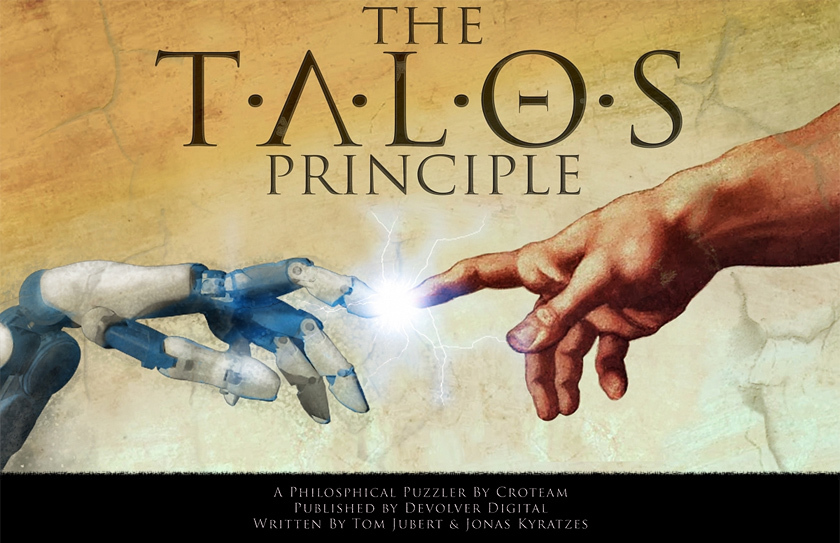
What: First Person Puzzler
Where: PC/Mac/Linux/PS4
When: Out now on all platforms
How much: $40/£30/€40 on PC (regional pricing applies), $50/£30/€40 on PS4 (includes expansion)
How long: 15-20 hours
How many: Single player
Demo: Yes
Recommended System Requirements:
OS: Windows 7 64-bit
Processor: Quad-core 3.0 GHz
Memory: 4 GB RAM
Graphics: DirectX 11 capable GPU (nVidia GeForce 470 GTX, AMD Radeon HD 5850)
DirectX: Version 9.0c
Hard Drive: 4 GB available space
Sound Card: DirectX9.0c Compatible Sound Card
Minimum System Requirements:
OS: Windows XP 32-bit (with service pack 3)
Processor: Dual-core 2.0 GHz
Memory: 2 GB RAM
Graphics: DirectX 10 capable GPU (nVidia GeForce 8600 series, AMD Radeon HD 3600 series, Intel HD 4000 series)
DirectX: Version 9.0c
Hard Drive: 4 GB available space
Sound Card: DirectX9.0c Compatible Sound Card
Trailers:
Teaser trailer
Public test trailer
Launch trailer
PS4 launch trailer
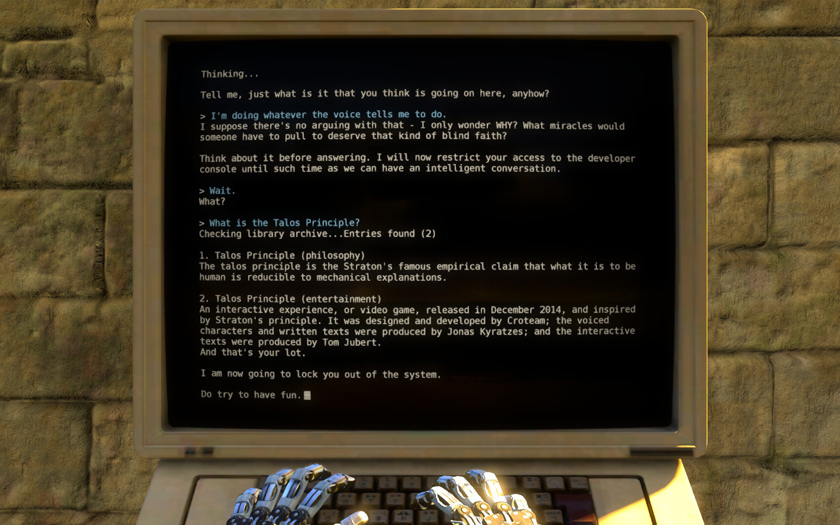
> You're telling me that Croteam, of all developers, made a highbrow, nonviolent puzzle game?
Yep.
> The guys who've released nothing but Serious Sam games for the past fifteen years?
The writing is by a pair of freelancers you might recognize from their work on FTL and The Swapper (Jubert), or The Infinite Ocean and The Sea Will Claim Everything (Kyratzes), but the rest of the work is all Croteam, yes.
> And what does a pack of FPS developers know about good puzzle design or philosophy?
Look, the story goes that, in the process of trying to introduce more creative puzzles than "use key with door" into Sam 4, the designers came up with a few mechanics and told the level designers to come up with some examples and see how far they could push them before something broke. What came back were a bunch of deviously complex brainteasers that the rest of the team loved, and from there they saw the potential to spin it out into a whole new IP that would let them explore some of the themes they'd been talking about together over their lunch breaks. And here we are.
There's nothing mind-blowingly new to it on a mechanical level, the way portals were, but it serves as proof enough that there's still a world of creativity to be found in the well-worn ground of lasers, boxes, pressure plates, and heat-seeking doom spheres.
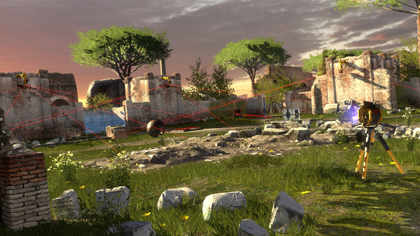
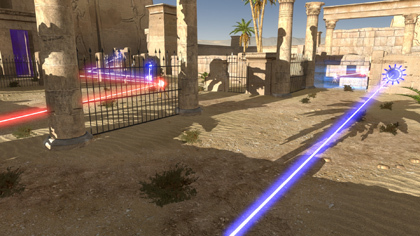
> I trust you implicitly. But what's it about, really?
You play as an AI inside a computer simulation of dubious stability, being guided by a booming voice from above who refers to himself as your creator, Elohim. Follow his will and you will fulfill your purpose, but... well, just stay out of the tower.
There are also old DOS-era terminals scattered around the simulation that contain archives of the in-universe developers' lives: scraps of e-mails, diary entries, chat logs, blogs, books they were reading, lecture notes, personal anecdotes, and so on, all largely aimed at questioning the nature of sentience, humanity, and what it means to be a person. And all that is curated by a fellow AI who governs the terminals and is more than willing to have a conversation.
The reading isn't strictly necessary, but it's certainly as much a part of the experience as the puzzle solving is.
As for the puzzle solving itself, the world is subdivided into three major hubs, each of which contains several connections to individual islands, each of which holds a number of discrete puzzles and the potential for further exploration and secret hunting. Solving a puzzle earns you a sigil, and completing a set of sigils lets you unlock more content elsewhere. Sigils aren't unique, so getting stuck on a particularly tricky puzzle doesn't mean that you can't find an identical one elsewhere to earn and move on with. Think Super Mario 64 in terms of overall structure, if it had Portal's test chambers, Deus Ex's penchant for philosophical arguments, and a little more Tetris involved than usual.
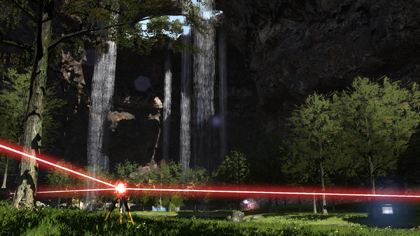
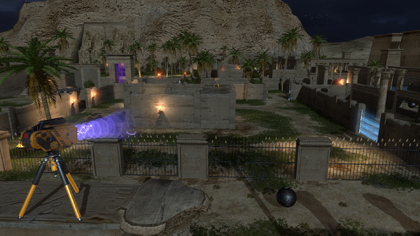
> Monkey Island taught me to never pay more than twenty bucks for a computer game.
I like Steam sales as much as the next guy, but this has a lot of meat on its bones. Croteam says it has north of 120 distinct puzzles while the reviews have all clocked in around the time estimate above, plus or minus a few hours, and I don't believe any of them cleaned up all of the game's secret content.
> I insist on having ludicrously fine-grained control over every conceivable aspect of the game's performance.
This is still a Serious Engine game.
> Can I try it first?
Yes, at least as long as the allegedly limited-time public test stays up. There's also a free tie-in minigame available if you really like arranging tetrominoes.
> Does this have anything to do with guiding a legendary god-king through a whimsically meta examination of the nature of choice and narrative in video ga-
No.
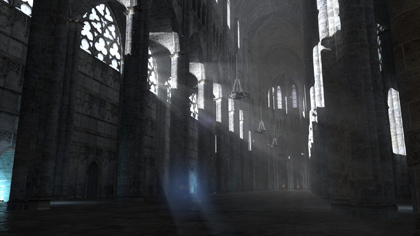
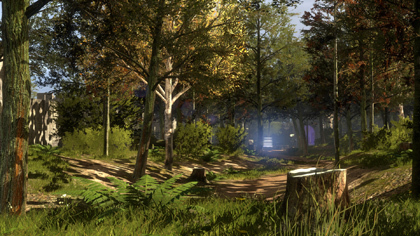
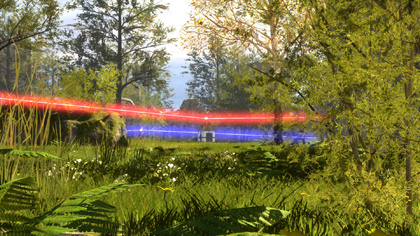
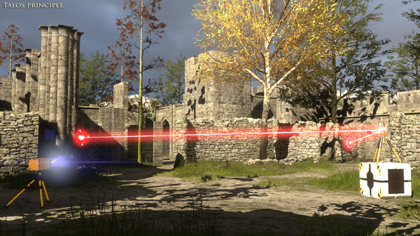
Reviews:
Eurogamer:
The Talos Principle is a game of challenges and conundrums and philosophical wonderings, filled with logic puzzles and cerebral mysteries. Its chunky mechanical processes are underpinned by a compelling breadcrumb-trail narrative that tackles the intangible notion of humanity and consciousness. Consequently, despite playing a robot that interacts with computer terminals and takes instruction from a disembodied voice in the sky, it exudes personality and charm; its mechanical precision complementing its aesthetic qualities. For an experience bereft of human contact it boasts a very big heart indeed.
RockPaperShotgun
Croteam’s The Talos Principle has a combination of neatly designed puzzles and philosophical pondering. It tickled my brainbuds and got inside my head in that way which sees you drawing diagrams of levels while on the tube or puzzling them out as you lie in bed pretending sleep might turn up at any moment. It’s one of my favourite games from 2014.
GamesBeat: 9/10
The Talos Principle’s hugely ambitious aim is to ask you to solve the ultimate puzzles, even as you solve the smaller ones that have been created for you: What is existence? What does it mean to be human, a person? And what exactly happened to human civilization, anyway?
PCWorld: 4.5/5
Portal changed puzzle games. I don't think there's much dissent on that. Or if it didn't change puzzle games, it at least was so unique in its execution, so interesting in the way it twisted standard shooter tropes, that it opened new avenues for puzzle games to go down.
And so they did. Since Portal's release we've had a number of imitators—Q.U.B.E., Quantum Conundrum, Antichamber, and hell, even Portal 2. They all tried to recapture some indescribable feeling many people had when originally playing Portal. They all achieved varying levels of success in that pursuit.
The Talos Principle comes closest, as far as I'm concerned.
Destructoid: 8/10
The Talos Principle has some important things to say, but more thoughtfully, it wants the player to have important things to say as well. Even those who do not bother to think about the philosophical topics can find a smart, sometimes frustratingly difficult puzzler here. It really shines for those open to both.
HardCoreGamer: 4/5
The large, beautiful worlds of The Talos Principle are filled with lovely ruins and pretty weather effects, making the time you’ll spend ramming your head against its stone walls and locked energy-doors a pleasantly relaxing experience despite its many periods of momentary frustration. One problem leads effortlessly into another and the reward for being clever is a requirement to up your game for the next area, which is exactly how a good puzzle game should be. The Talos Principle expects you to be smart and knows you’ve got the brain to figure it out, and the reward for it being right is the a sense of satisfaction at solving something properly tricky.
PC Gamer: 84
I'm fascinated by The Talos Principle's lack of visual artistic direction. This landscape of remixed Greek, Egyptian and medieval styles is technically accomplished but says absolutely nothing: a sense compounded by the fact that the developers let you fiddle with colour filters from the main menu. More than anything else it reminds me of those benchmarking demos that used to ship with 3DFX cards in the late '90s—depopulated ruins presented for their complexity only, any human point of reference secondary to some mechanical process churning away beneath the surface.
In another game I'd write that line off as overthink. Chances are, nine times out of ten, that art that says nothing was trying to say something and failed. I don't think that's true for The Talos Principle. If any game was going to look like a Voodoo 5's fever dream on purpose it'd be the one with a wide-ranging interest in machine-generated worlds, artificial intelligence, and the way that personality imprints itself on nothingness. The game is clever enough to pull something like that off, and generous enough in its puzzle design to make you feel clever into the bargain. If you're actually a person, that is. There's still some doubt on that front.
GameFront: 90/100
This is The Talos Principle: You’re a living human playing a computer simulation as a robot playing a computer simulation, and answering philosophical questions posed by another computer about the nature of what it is to be a person.
Jim Sterling: 9.5/10 & Honorable GOTY
Gamespot: 9/10
Polygon: 8.5/10
GameTrailers: 9.2/10 & Puzzle/Adventure GOTY
Joystiq: Excellence Award winner
The Escapist: 4/5
IGN: 8.3
Game Informer: 9/10
gamegrep
Motherboard
Pixel Dynamo: 8.3/10
Darkstation: 5/5
Front Towards Gamer: 8/10
Digital Spy: 5/5
Gaming Trend: 100/100
The arts desk: 5/5
The Daily Crate
Canadian Online Gamers: 91/100
Slant Magazine
IGN Italy: 9.2
IGN Spain: 9.0
Vandal: 9/10 (Spanish)
ComputerBild.de: 88/100
GAF Says:
This is the best game I've played this year and I don't say that lightly. The game is one of the most mind blowing puzzle games I've played and it constantly surprises and bewilders you, creating some of the most rewarding puzzle gameplay I've experienced. ... Anyway, just thought I'd give my thoughts, but if you like puzzle games with a narrative that will make you think, then simply get this. One of the best puzzle games ever made and it's up there with Portal, Antichamber and the like. Great stuff.
Sublime. Will be on my GOTY list for sure.
I've been playing this for a few weeks now and as a puzzle fan, I love it. Hits all the right notes.
Almost certainly my favorite first person puzzle game to date, beating out the Portals in terms of challenge and cleverness despite having less inventive mechanics.
Bought this to satisfy a random urge to play a puzzle game and am absolutely loving every minute second of it.
Well, Steam says I played 8.8 hours so far and I'm maybe 1/3 or 1/2 of the way through.
Perhaps much more unusual for me, those 8.8 hours were practically consecutive. I'm not sure I remember the last time I picked up a new game and was glued to it for that long.
It runs great, looks good, has good music, and reminds me quite favorably of Portal 1 and Portal 2. That's about as high praise as I can give a puzzle game. I really like the bits of story.
I'm on Level 7 of "Cathedral A", and I'm really loving it. Played for almost 4 hours straight, something that I never do with a game.
I'm loving to read every piece of information, and it's making me interested to read some Philosophical books that were recommended here.
Can't wait to get home tonight to play it more!
